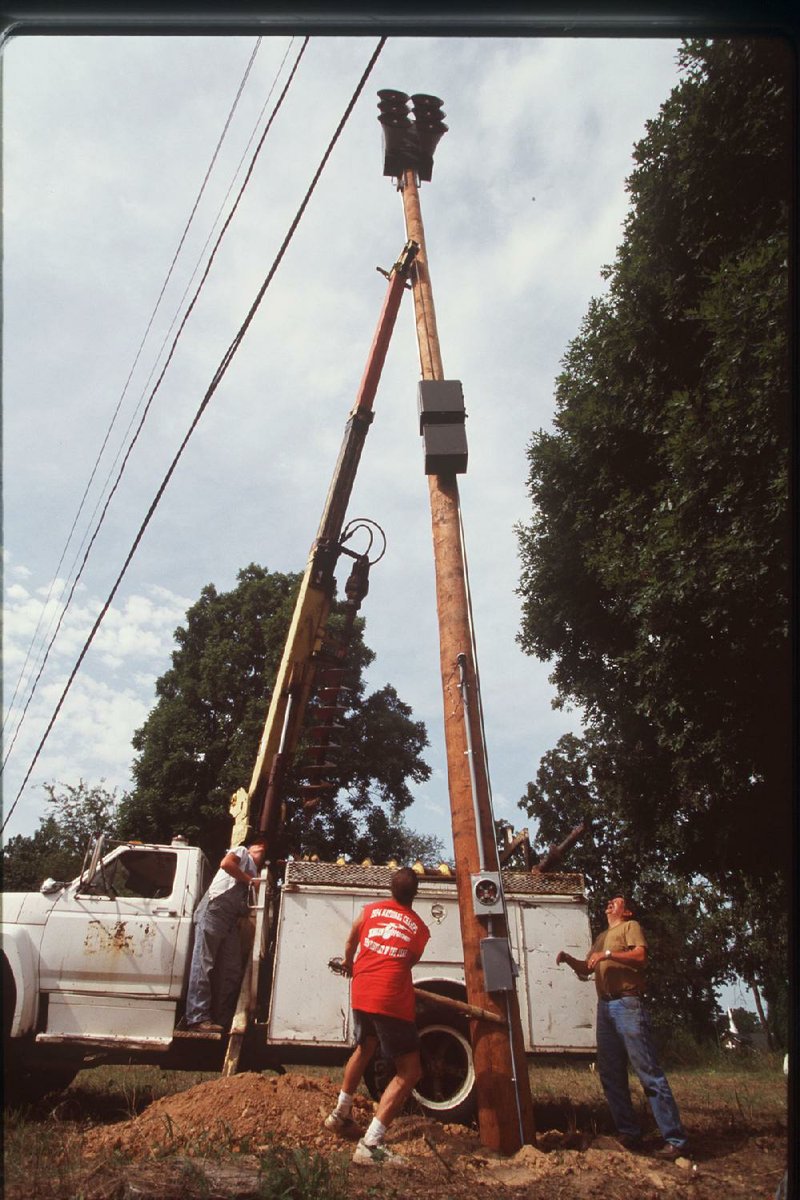Dear Otus,
Our Chenal Valley neighborhood had what must have been one of the last klaxon tornado warning poles in the city -- like the ones we used to have in Bono. Last week they replaced it with one of those birdhouse-looking models, but when the noon Wednesday siren test came, it played music. What's with that?
-- Lowell Jumper,
Little Rock
Dear Lowell,
It was wholly a pleasure to hear from you and, yes, yours was the last old yellow klaxon to be replaced.
Designed in the old "duck-and-cover" Cold War days, the bulky klaxons did double duty as the ear-splitting clarions of impending nuclear Armageddon and approaching nasty weather.
These days, we all know the tornado drill: The skies grow sullen and foreboding and the TV weather guy breaks into your favorite program. The neighborhood warning siren goes off, and everyone runs into the front yard with their iPhones to take videos.
Several years ago, Little Rock city officials decided the old signal (a single-tone harmonic multiple of 580 Hz) was not very efficient because it gave no clue as to how far away a storm was. The new warning system, however, solves that problem.
There are now 187 new sirens all over town looking like so many high-tech starling houses. The final one was installed in Chenal last week, and the city held a news conference in its shadow.
"This is the latest version of the WPS-2900," city manager Bruce Moore said with pride. "She's a 315 db, omnidirectional, dual-tone siren with single-phase motor manufactured by SafetyCom, the Lexus of the industry."
Moore paused for dramatic effect and added, "The WPS-2900 is also a high-performance, multi-driver tower that will reveal all the nuance, detail and dimensionality of the finest audiophile recordings, while enclosing ample internal volume without compromising bass power or extension."
Moore noted the new sirens have specially designed 45-inch subwoofers, extra large vented magnets, 400 mm copper-clad aluminum voice coils on titanium bobbins with low-loss inductors and polypropylene capacitors on six independent glass epoxy boards.
"It's a gnarly wall of sound," Moore said.
The computerized solar battery-powered sirens are capable of far more than the old signals. The familiar nationally standardized signal will still be used for the noon Wednesday sound test, but when storms threaten, the new sirens will switch to mixtape mode.
"Studies have shown a musical approach is much less stressful to the general public in times of severe weather," Mayor Mark Stodola said. "It's far more conducive to taking the appropriate action."
From now on, when menacing storms approach, a series of danger warning tunes will blanket the city.
This week, each home in Little Rock should be receiving a brochure with the annotated playlist of the new siren warning system. When you hear the music start, be prepared.
When an approaching storm system containing hail, damaging wind or potential tornadoes is 45 minutes out, Bill Withers' "Ain't No Sunshine" will play. Thirty minutes from Little Rock, the sirens will switch to "Stormy Weather" (the Billie Holiday version). Bob Dylan's "A Hard Rain's A-Gonna Fall" kicks in when the storms are 20 minutes away.
At 15 minutes before the line hits, the pace picks up with The Doors' "Riders on the Storm," and at 10 minutes out the sirens switch to Creedence Clearwater Revival's "Who'll Stop the Rain?"'
When the bad weather is a mere five minutes from Little Rock, the sirens will play Garth Brooks' "The Thunder Rolls" and when the threatening weather is imminent, the city will hear a Dirty White Boys' cover of Little Big Town's "Tornado" (rights to the original were too pricey). For variety, that will alternate with the Rolling Stones' "Gimme Shelter" every other storm.
As the bad weather passes, the sirens will switch to "Storms Never Last" by Waylon Jennings. The all-clear will be signaled by Israel Kamakawiwo'ole's version of "What a Wonderful World."
"We were thinking about finishing up with 10 or 15 minutes of Bobby McFerrin's 'Don't Worry, Be Happy,'" Stodola said, "but wiser heads prevailed."
Until next time, Kalaka reminds you to keep that playlist handy and your eyes (and ears) to the sky.
Disclaimer
Fayetteville-born Otus the Head Cat's award-winning column of humorous fabrication appears every Saturday. Email:
mstorey@arkansasonline.com
HomeStyle on 08/08/2015
